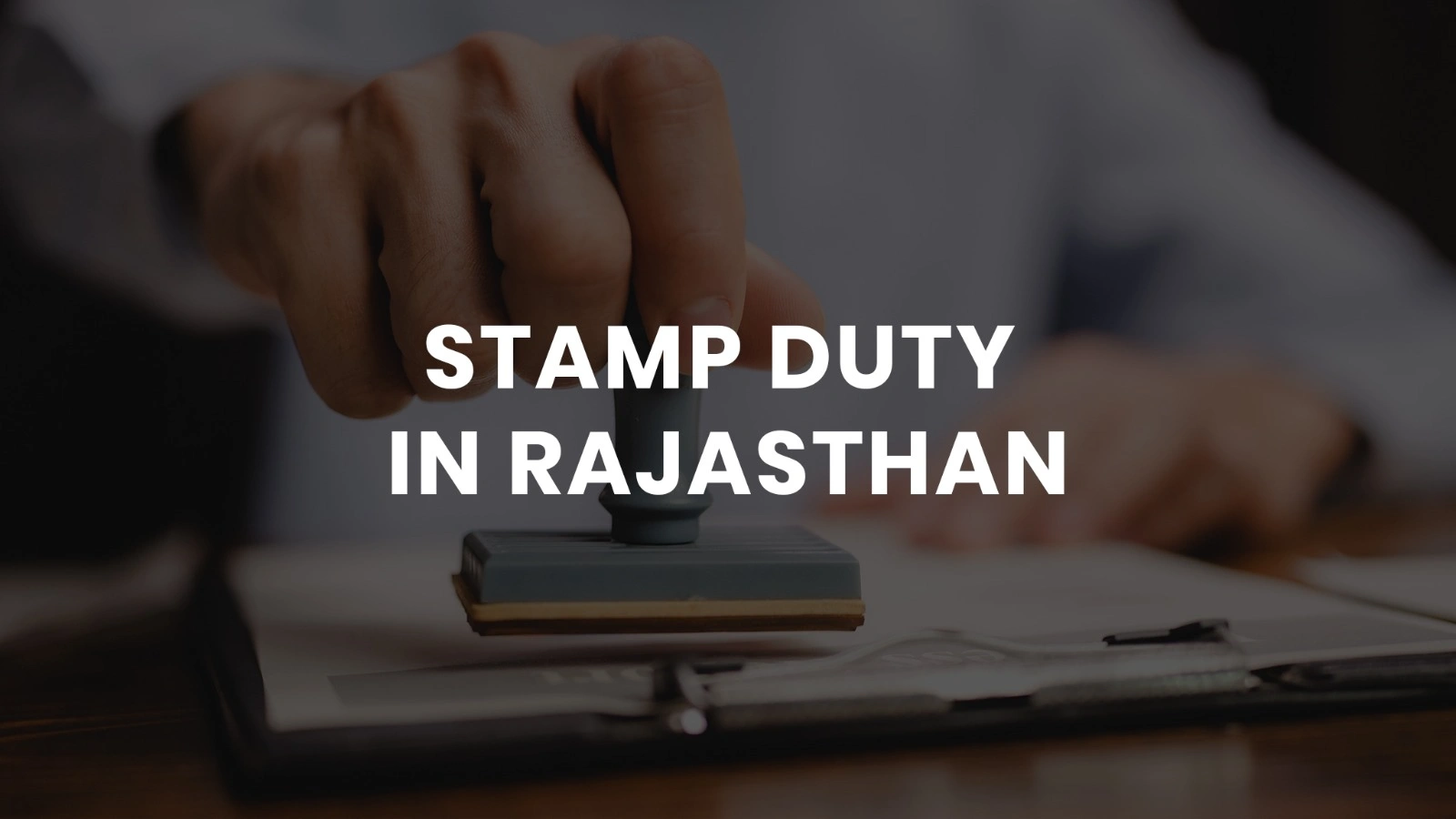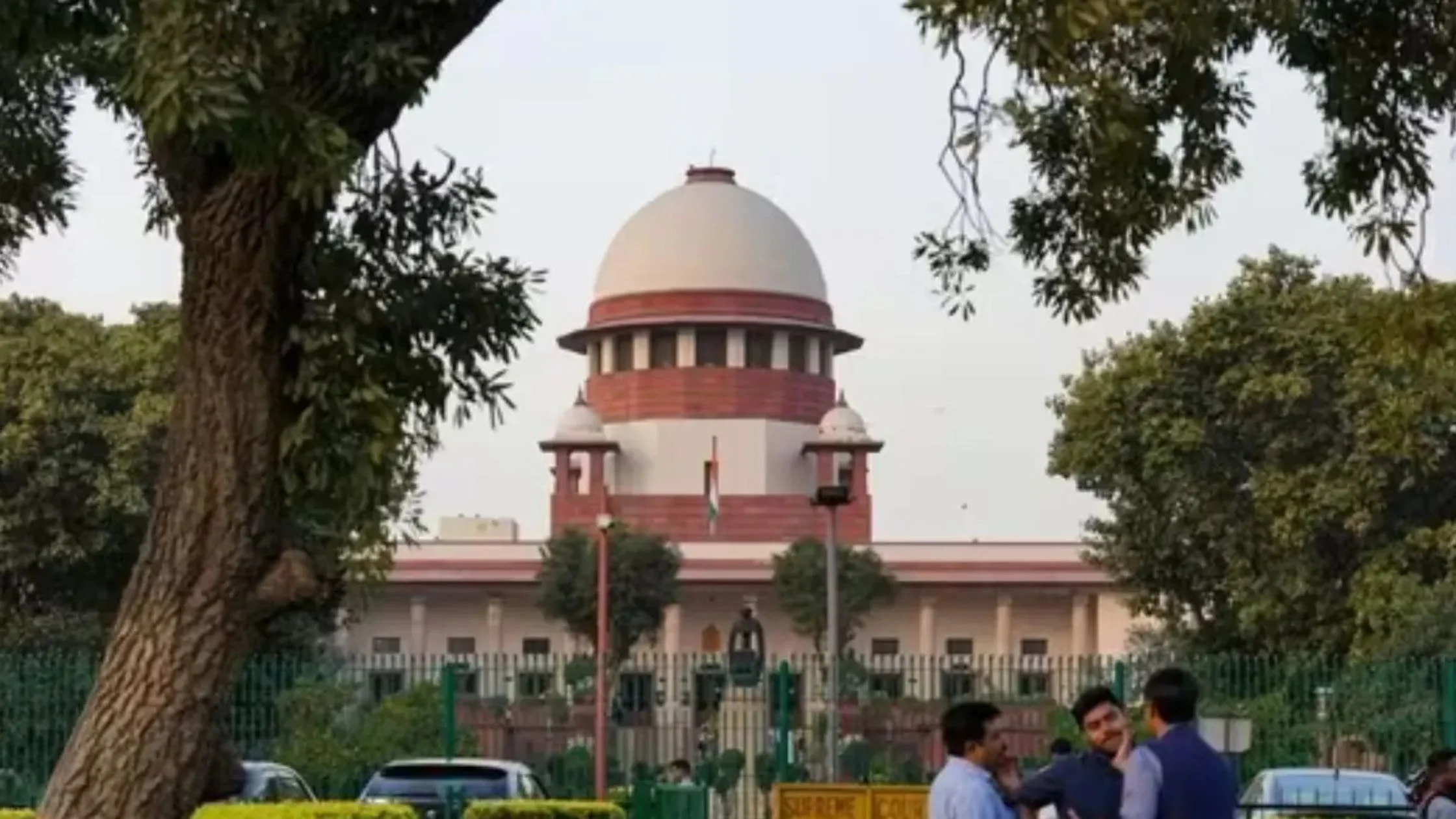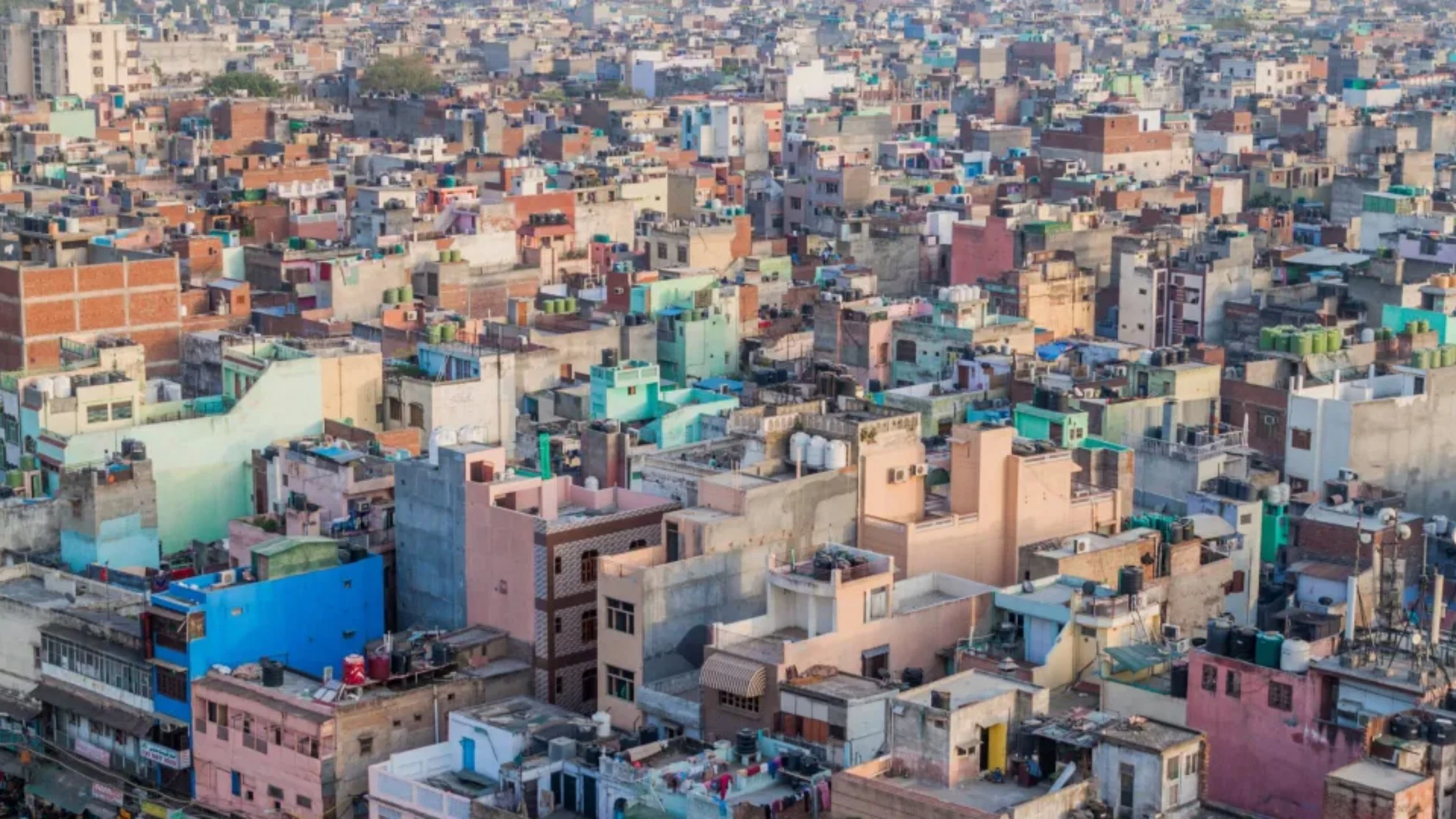Table of Content
▲- 1. What is Stamp Duty?
- 2. What is Property Registration?
- 3. Stamp Duty Rates in Rajasthan for 2024
- 4. Property Registration Charges in Rajasthan 2024
- 5. Calculating Stamp Duty in Rajasthan and Registration Fees
- 6. Factors Affecting Stamp Duty Rates
- 7. Exemptions and Concessions on Stamp Duty in Rajasthan
- 8. Penalties for Late Payment of Stamp Duty in Rajasthan
- 9. How to Pay Stamp Duty and Registration Charges in Rajasthan
- 10. Required Documents for Property Registration
- 11. Market Trends in Rajasthan’s Real Estate for 2024
- Conclusion
- 1. What is Stamp Duty?
- 2. What is Property Registration?
- 3. Stamp Duty Rates in Rajasthan for 2024
- 4. Property Registration Charges in Rajasthan 2024
- 5. Calculating Stamp Duty in Rajasthan and Registration Fees
- 6. Factors Affecting Stamp Duty Rates
- 7. Exemptions and Concessions on Stamp Duty in Rajasthan
- 8. Penalties for Late Payment of Stamp Duty in Rajasthan
- 9. How to Pay Stamp Duty and Registration Charges in Rajasthan
- 10. Required Documents for Property Registration
- 11. Market Trends in Rajasthan’s Real Estate for 2024
- Conclusion
In 2024, Rajasthan's real estate market continues to grow steadily, drawing in both local and national property buyers. When purchasing or selling property in Rajasthan, understanding stamp duty and property registration charges is crucial. These charges are legal fees collected by the government and are applicable in various real estate transactions.
In this article, we’ll break down everything you need to know about stamp duty in Rajasthan and property registration charges in 2024. We’ll cover what these charges are, how they are calculated, what exemptions are available, and tips to save on costs.
1. What is Stamp Duty?
Stamp duty is a tax that the government levies on legal documents, typically in the context of property transactions. It serves as evidence of the transaction and is essential for the legal recognition of property transfer. Stamp duty must be paid in full for the sale deed to be valid in the eyes of the law.
2. What is Property Registration?
Property registration involves recording the property transaction in the official records, providing legal proof of ownership. In Rajasthan, this process includes paying a registration fee along with the stamp duty. Property registration ensures that the transaction is legally binding, protecting the buyer from disputes and fraudulent claims in the future.
3. Stamp Duty Rates in Rajasthan for 2024
Stamp duty rates differ across states in India. In Rajasthan, the stamp duty charges are determined based on the property type and the gender of the buyer. The following is a breakdown of the stamp duty rates in 2024:
|
Buyer Category |
Stamp Duty Rate (Urban Areas) |
Stamp Duty Rate (Rural Areas) |
|
Male |
6% |
5% |
|
Female |
5% |
4% |
|
Joint (Male & Female) |
5.5% |
4.5% |
|
Joint (Both Female) |
5% |
4% |
Note: For properties purchased by women, there’s a concession of 1% in stamp duty rates compared to men.
4. Property Registration Charges in Rajasthan 2024
Along with stamp duty, you also need to pay a registration charge to officially register the property in Rajasthan. The property registration charges in Rajasthan for 2024 are as follows:
- Registration Fee: 1% of the property’s market value.
- Flat Rate on Properties Below INR 50,000: For properties valued under INR 50,000, a flat registration fee of INR 1000 is applied.
5. Calculating Stamp Duty in Rajasthan and Registration Fees
The calculation of stamp duty and registration fees depends on the property's market value or the sale consideration, whichever is higher. Let’s take an example to illustrate the calculation:
Example:
- Property Value in Jaipur (Urban Area): INR 50,00,000
- Buyer Type: Male
- Stamp Duty Rate: 6%
- Registration Fee: 1%
Stamp Duty Calculation:
- Stamp Duty = 6% of INR 50,00,000
- Stamp Duty = INR 3,00,000
Registration Charge Calculation:
- Registration Charge = 1% of INR 50,00,000
- Registration Charge = INR 50,000
Thus, the total amount payable would be INR 3,50,000.
6. Factors Affecting Stamp Duty Rates
Several factors influence the stamp duty rates, including:
- Property Location: Stamp duty is typically higher in urban areas compared to rural areas.
- Gender of Buyer: Women enjoy a 1% concession in stamp duty rates.
- Property Usage: Whether the property is for residential or commercial purposes also affects the rate.
- Market Value: The government-calculated market value of the property influences the overall cost.
Also Read: State-wise stamp duty in India 2024
7. Exemptions and Concessions on Stamp Duty in Rajasthan
The government offers certain exemptions and concessions in stamp duty payments in Rajasthan. These include:
- Women Homebuyers: As mentioned earlier, women are offered a 1% reduction in stamp duty rates.
- Affordable Housing Schemes: Properties purchased under affordable housing schemes may be eligible for further concessions.
- Government Land Allotments: Government-allotted land may also have reduced stamp duty rates.
It’s important to check if you qualify for any of these concessions before finalizing the transaction.
8. Penalties for Late Payment of Stamp Duty in Rajasthan
Failure to pay the stamp duty on time can lead to legal complications, penalties, and fines. The Rajasthan government may levy a penalty for late payment or insufficient payment of stamp duty, which could go up to 10 times the unpaid amount. Hence, it is crucial to ensure timely payment.
9. How to Pay Stamp Duty and Registration Charges in Rajasthan
There are multiple ways to pay stamp duty and registration charges in Rajasthan:
- e-Stamping: You can pay online using the Stock Holding Corporation of India Limited (SHCIL) portal.
- Physical Stamp Paper: Purchase non-judicial stamp paper from licensed vendors and pay the stamp duty through it.
- Franking: The bank or authorized agencies can stamp your documents to indicate that stamp duty has been paid.
10. Required Documents for Property Registration
To register property in Rajasthan, you will need the following documents:
- Sale deed signed by both parties
- Proof of identity (Aadhar card, Voter ID, Passport, etc.)
- Proof of property ownership
- PAN card
- Encumbrance certificate
- Power of attorney (if applicable)
- Receipt of payment for stamp duty and registration charges
11. Market Trends in Rajasthan’s Real Estate for 2024
The real estate market in Rajasthan continues to grow, with increasing demand in urban centers like Jaipur, Udaipur, and Jodhpur. Several affordable housing projects and infrastructure developments have spurred the demand for properties, resulting in a consistent rise in property prices.
Additionally, government schemes like the PMAY (Pradhan Mantri Awas Yojana) and reduced interest rates on home loans are encouraging more homebuyers to invest in property in Rajasthan.
Conclusion
Understanding stamp duty and property registration charges is an important aspect of property transactions in Rajasthan. By staying informed about the rates, calculation methods, and potential exemptions, you can ensure a smooth transaction and avoid unnecessary costs. Always consult with legal professionals or property experts for advice specific to your situation.
Also Read: Stamp Duty on Gift Deed: A Comprehensive Guide
In 2024, Rajasthan's real estate market continues to grow steadily, drawing in both local and national property buyers. When purchasing or selling property in Rajasthan, understanding stamp duty and property registration charges is crucial. These charges are legal fees collected by the government and are applicable in various real estate transactions.
In this article, we’ll break down everything you need to know about stamp duty in Rajasthan and property registration charges in 2024. We’ll cover what these charges are, how they are calculated, what exemptions are available, and tips to save on costs.
1. What is Stamp Duty?
Stamp duty is a tax that the government levies on legal documents, typically in the context of property transactions. It serves as evidence of the transaction and is essential for the legal recognition of property transfer. Stamp duty must be paid in full for the sale deed to be valid in the eyes of the law.
2. What is Property Registration?
Property registration involves recording the property transaction in the official records, providing legal proof of ownership. In Rajasthan, this process includes paying a registration fee along with the stamp duty. Property registration ensures that the transaction is legally binding, protecting the buyer from disputes and fraudulent claims in the future.
3. Stamp Duty Rates in Rajasthan for 2024
Stamp duty rates differ across states in India. In Rajasthan, the stamp duty charges are determined based on the property type and the gender of the buyer. The following is a breakdown of the stamp duty rates in 2024:
|
Buyer Category |
Stamp Duty Rate (Urban Areas) |
Stamp Duty Rate (Rural Areas) |
|
Male |
6% |
5% |
|
Female |
5% |
4% |
|
Joint (Male & Female) |
5.5% |
4.5% |
|
Joint (Both Female) |
5% |
4% |
Note: For properties purchased by women, there’s a concession of 1% in stamp duty rates compared to men.
4. Property Registration Charges in Rajasthan 2024
Along with stamp duty, you also need to pay a registration charge to officially register the property in Rajasthan. The property registration charges in Rajasthan for 2024 are as follows:
- Registration Fee: 1% of the property’s market value.
- Flat Rate on Properties Below INR 50,000: For properties valued under INR 50,000, a flat registration fee of INR 1000 is applied.
5. Calculating Stamp Duty in Rajasthan and Registration Fees
The calculation of stamp duty and registration fees depends on the property's market value or the sale consideration, whichever is higher. Let’s take an example to illustrate the calculation:
Example:
- Property Value in Jaipur (Urban Area): INR 50,00,000
- Buyer Type: Male
- Stamp Duty Rate: 6%
- Registration Fee: 1%
Stamp Duty Calculation:
- Stamp Duty = 6% of INR 50,00,000
- Stamp Duty = INR 3,00,000
Registration Charge Calculation:
- Registration Charge = 1% of INR 50,00,000
- Registration Charge = INR 50,000
Thus, the total amount payable would be INR 3,50,000.
6. Factors Affecting Stamp Duty Rates
Several factors influence the stamp duty rates, including:
- Property Location: Stamp duty is typically higher in urban areas compared to rural areas.
- Gender of Buyer: Women enjoy a 1% concession in stamp duty rates.
- Property Usage: Whether the property is for residential or commercial purposes also affects the rate.
- Market Value: The government-calculated market value of the property influences the overall cost.
Also Read: State-wise stamp duty in India 2024
7. Exemptions and Concessions on Stamp Duty in Rajasthan
The government offers certain exemptions and concessions in stamp duty payments in Rajasthan. These include:
- Women Homebuyers: As mentioned earlier, women are offered a 1% reduction in stamp duty rates.
- Affordable Housing Schemes: Properties purchased under affordable housing schemes may be eligible for further concessions.
- Government Land Allotments: Government-allotted land may also have reduced stamp duty rates.
It’s important to check if you qualify for any of these concessions before finalizing the transaction.
8. Penalties for Late Payment of Stamp Duty in Rajasthan
Failure to pay the stamp duty on time can lead to legal complications, penalties, and fines. The Rajasthan government may levy a penalty for late payment or insufficient payment of stamp duty, which could go up to 10 times the unpaid amount. Hence, it is crucial to ensure timely payment.
9. How to Pay Stamp Duty and Registration Charges in Rajasthan
There are multiple ways to pay stamp duty and registration charges in Rajasthan:
- e-Stamping: You can pay online using the Stock Holding Corporation of India Limited (SHCIL) portal.
- Physical Stamp Paper: Purchase non-judicial stamp paper from licensed vendors and pay the stamp duty through it.
- Franking: The bank or authorized agencies can stamp your documents to indicate that stamp duty has been paid.
10. Required Documents for Property Registration
To register property in Rajasthan, you will need the following documents:
- Sale deed signed by both parties
- Proof of identity (Aadhar card, Voter ID, Passport, etc.)
- Proof of property ownership
- PAN card
- Encumbrance certificate
- Power of attorney (if applicable)
- Receipt of payment for stamp duty and registration charges
11. Market Trends in Rajasthan’s Real Estate for 2024
The real estate market in Rajasthan continues to grow, with increasing demand in urban centers like Jaipur, Udaipur, and Jodhpur. Several affordable housing projects and infrastructure developments have spurred the demand for properties, resulting in a consistent rise in property prices.
Additionally, government schemes like the PMAY (Pradhan Mantri Awas Yojana) and reduced interest rates on home loans are encouraging more homebuyers to invest in property in Rajasthan.
Conclusion
Understanding stamp duty and property registration charges is an important aspect of property transactions in Rajasthan. By staying informed about the rates, calculation methods, and potential exemptions, you can ensure a smooth transaction and avoid unnecessary costs. Always consult with legal professionals or property experts for advice specific to your situation.
Also Read: Stamp Duty on Gift Deed: A Comprehensive Guide









_1770286619.webp)
Ans 1. The current stamp duty rate for property registration in Rajasthan varies based on the type of property and the location, typically ranging from 3% to 6%.
Ans 2. Property registration charges in Rajasthan are generally 1% of the property's market value, in addition to stamp duty.
Ans 3. Yes, there are exemptions for certain categories such as female property owners, government schemes, and properties below a certain value threshold.
Ans 4. Stamp duty in Rajasthan is calculated based on the property's market value or sale deed value, whichever is higher.
Ans 5. Yes, women receive a reduced stamp duty rate, typically 1% to 2% lower than the rate applicable for men.